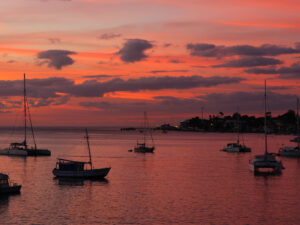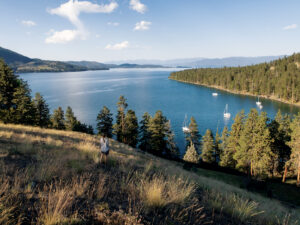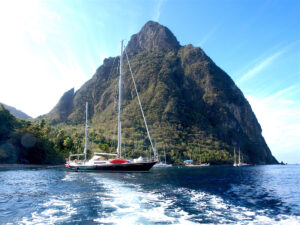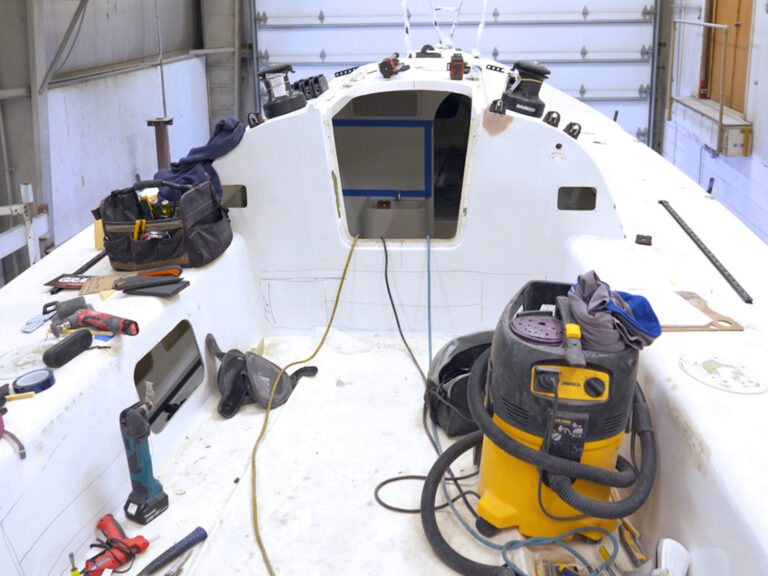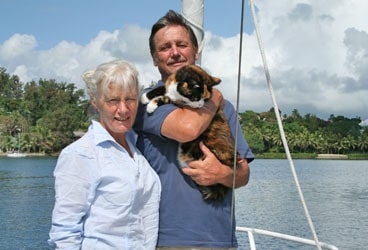
Alvah Simon and Family 368
Diana and I had our version of a discussion this week regarding our next destination. Her firm answer was, “Get north, out of the cyclone belt.” In fact her answer to, “What should we do for dinner tonight, Honey?” was, “Get north out of the cyclone belt.”
I excitedly told her about the very remote Polynesian atoll, Ontong Java. “Admittedly,” I explained, “it is 450 miles out of our way to the west-northwest. Miles that do not get us, er…directly north. But really! The name alone conjures up such…” I dribbled off as she gave me a look that could strip paint.
I turned to our pilot book, looking for alternatives on a less circuitous route to safety. I love this old book not just because of its encyclopedic information, but because its colorful colonial language would make even Joseph Conrad quiver in anticipation of a grand adventure.
Of the Swallow Islands (or commonly called the Reef Islands) to our northeast, it read, “The inhabitants appear to be bold navigators, sailing their double canoes as far as Tikopia, which lies 190 miles south-eastward. They were formerly reputed to be rough, treacherous, and fearless.” (I.E., sailors)
The Anglican priest at the vocational school, Father Nathaniel, brought his family to the boat for a visit. I told him of our new plans. He became quite grave, and even though a Reef Islander himself, cautioned us to always be alert there. He accentuated his point by dropping his head and praying out loud for our safety.
A pre-dawn departure allowed us to fetch the Swallows with just enough fading light to enter Mohawk Bay. The anchor was no sooner down than canoes raced up around us. The first fellow to approach was a tall muscular man, his head shaved from the top of his ears down, leaving a wild-looking top-knot. Robert was a big boy, with a confidence bordering on arrogance. The only way to handle this was to immediately invite him onboard. The others followed without hesitation. Di later told me that she watched their eyes, and that they had the boat cased in a matter of minutes.
The Reef Islanders are a large, handsome, bright, and active people. Rather applying these traits to shaping exceptional oceangoing canoes, fishing, sailing, waging war, or the reallocation of personal property, they do so with a certain elan. If women anywhere in the world are more beautiful, I have not yet met them.
Dr. David Lewis spent much time here with the famed navigator, Basil Tavake. I hoped to meet his descendants.
The main village is on a very small island just adjacent to a relatively larger island, but still no more than a mile wide. A rangy fellow named Douglas told me that in the last of many cyclones the entire island was swept abreast with crashing waves and his house was smashed away. “I moved my family to the mainland,” he explained, “so we can run away to the bush when the next one comes.” That got Diana’s attention.
We rowed into Douglas’s camp on the “mainland” and then with him paddled to the village. I had sent word into Chief Augustine that we would be coming in to pay our respect. He must have thought I wanted to address the entire village because he had them assembled by the dozens under a mango tree.
I was tempted to start with, “You are probably wondering why I called you all here.” I mean, how often in life do you actually get to use that line? Instead, I gave them a simple explanation of who we are and why we are here.
I brought out a piece of paper that I cut up into small squares and handed them out to men and women alike. I passed around a pouch of fine French rolling tobacco which, based on the big smiles, was apparently a nice treat.
I was offered a jam jar of naturally fermented coconut beer. The fluid was thick and sweet, but after only three swigs I could feel a tingle on the top of my head. I took Douglas aside and booked a “session” with the boys for later in the week.
We agreed that four men would join me on the Roger Henry for a dive day on the outer reef. They told me Robert was their champion free diver. The word “contest” wasn’t used, but make no mistake, they take the measure of a man.
In the morning Robert, Douglas, an elderly man, and a teenager hopped onboard for our big day out. They carried with them some straight pieces of rusty steel wire as spears, a strap of rubber tied to a stick. Also, in a bag was a trail-mix of dried breadfruit segments and nali nuts, and of course a brace of coconuts.
Whatever respect I gained by my deep diving was lost when I hesitated in murdering a large, lovely, and rare Maori wrasse. They just couldn’t understand. At 50 pounds it could have fed the village, and after all, that was the object of our exercise.
Over the next two days we traded for rough carvings, more out of politeness than need. But when a man named Boniface paddled up in a wonderfully sculpted canoe, I told Di that anyone who could shape that canoe with a hand adze would also have a sure hand at carving artifacts. I asked him to bring back some of his work. Sure enough, the man is a real talent. We both left the bargaining table happy.
We tried to go for a hike with Douglas’s lovely wife, Dorothy, and a boisterous group of naked children. But only twenty minutes down the trail an old man came running out of his hut and insisted we immediately return to our boat. It was not safe to leave it unattended. He was so insistent that to ignore him would have seemed disrespectful.
Unfortunately, a week of strong northwesters was predicted. Mohawk Bay, the only viable anchorage, is wide open to the northwest. Douglas told me not to worry; we would still have our “session.” He had cast the magic leaves to assure us favorable winds. He explained that whenever he needs to go to Santa Cruz, he casts the leaves for a northeast wind, and when he is ready to return he just uses a different spell to conjure up southwesters. Di wasn’t so assured.
When the South Pacific weather guru, Bob McDavitt, issued his weekly bulletin he stated that he had been wrong in his prior predictions of a late cyclone season. In fact, conditions were such that any vessels near the South Pacific Convergence Zone (read here us) should exercise all caution in the week to follow. When the latitude and longitude of a cyclone forming to the west were announced, Diana suggested that I should be preparing crow instead of turkey for Thanksgiving. She got up and started to take down the sun tarp.
We are sailors. Our success lies in a skill set called seamanship that requires bold and decisive action yet always tempered by a touch of prudence. My disappointment over a premature departure from these exciting islands aside, I had no logical argument to present to Diana. I started pulling up the dingy.

